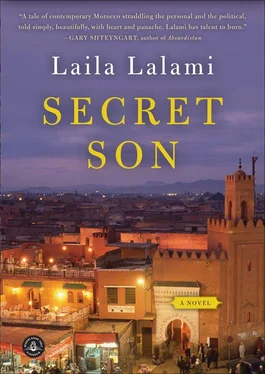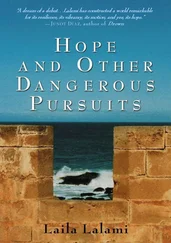His mother’s voice came to him from far away. “I brought some sweets,” she said. “Do you want some?” She had returned home from the neighbor’s betrothal, and he had not even heard her come into the room. Mmi. Mmima.
“I’m not hungry,” he said.
He would do this for her — for all those who were victims of people like his father. He turned to face the wall. Hatim was right. One man could restore some balance to this imbalanced country. Youssef would be that man.

On weekdays, Amal was able to distract herself with work — her duties at the company, the dinners and cocktail parties she had to attend nearly every night, the occasional trips to Paris and Madrid for supplier conferences — but Saturdays and Sundays stretched themselves out before her, long and uncertain, like a treacherous river she had to cross. She never knew if she would be able to make it to the safety of Monday, to the numbing comfort of her desk. The slatted light fell on her bed, but she turned away from it and tried to go back to sleep. Weekends were hard, and this was one hardest of all.
Today marked the anniversary of their meeting, at a symposium in the Geography Department at UCLA, which she had attended not because of any particular interest in the study of the earth, but because The Daily Bruin had said that the event would feature a Lebanese buffet lunch. Fernando had seen her pile her plate with stuffed grape leaves and pita bread, and he leaned in and whispered that there was an even better buffet in the History Department that week. She had been too embarrassed to say anything, and she mumbled something about having to catch her 2 p.m. class and walked out. Of course she had run into him the next day, when he was escorting one of the guest speakers out, and she had been mortified to be seen hovering over the food, once again. Weeks went by. One day, she bumped into him at an antiwar rally on campus. He asked whether she wanted to get a cup of coffee, and she said yes, if she could pay for both of them — after all, it was thanks to him that she had found the treasure trove of buffets. On the way over, he asked about the paperback that poked out of her purse. “Imaginary Homelands,” she said.
“I love the part about growing up kissing books and bread,” he said, running a finger on the spine.
They went on their first date the next day, decided to move in together two years later, and shortly after that, she left him behind, trading his love for the love of father and mother, the love of country, the love of home. She had been told to make a choice, and though she still had no idea why, she had chosen. On the way from the airport to the house, she had lowered her window and stuck her head out. “I invoke God,” her mother shrieked, pulling strands of her no-longer-perfect bob from her eyes, “what are you doing?”
“I’m smelling the city,” Amal said, taking a long, deep breath — but it was hard to detect anything over the powerful odor of diesel gas and the particles of dust and soot.
“It’s cold,” her father complained. “Close your window.”
Amal pressed the button and sat back in her seat. Maybe her olfactory senses were weakened by her jet lag; she was dehydrated; she was getting a cold. That was why Casablanca did not smell to her like it used to, like a cocktail of odors: tea and coffee, sea breeze and fritters, fresh bread and cigarette smoke, human urine and animal excrement. As she settled back into her old life, everything struck her as different about the city — the unbreathable air, the constant sound of construction, the ubiquity of mobile phones and pickpockets, the luxury-brand stores on all the major streets. Foolishly, she had expected Casablanca to remain as she had left it, as if it had been frozen in time in her absence. But the city had grown: Parts of it had flourished; others had festered, afflicted by the combined cancers of greed and corruption. (Or were those things there all along, and she had never noticed? She did not know.)
The few friends she saw, those who had never left to study abroad, teased her that she acted differently now. When she tried to pay for her own ticket to the movie theater, the response would quickly come: You think this is America? I invited you; I’m paying. When she complained that the company driver who picked her up from the train station in Rabat to take her to a business meeting was late, she was told with a chuckle, Was’i khatrek. This is Morocco, not America. When she expressed outrage at the threats made against Farid Benaboud after another article denouncing corruption in the government, she was scolded: The trouble he finds himself in is his own fault. Where does he think he is? Home was Morocco. America was away. And there was not much more to it than that. You are back home now, they said, everything will fall into place soon.
Over time, though, it seemed to her that the different loves to which she owed an allegiance were being tested against reality. Her parents fought more than ever before — not about important things, but about insignificant ones, like who sent an invitation to Madame Ilham, that insufferable bore; who was always hidden behind a newspaper; who bought another painting without consideration for where in the house it would go; who preferred to watch a movie rather than talk to his daughter. Amal grew tired of keeping score. She wondered why her parents chose to stay married when all they did was bicker.
It took her several months to gather up the interest and the courage to find her brother. She had to coax Omar to tell her what he knew. (“Not much, lalla Amal. I once heard him say something about Sector Five. I don’t know that area very well. You should not go. It’s not safe there.”) She had driven around Hay An Najat until she found the right sector, parked in front of a hanout, and asked the proprietor for the right block number. She had given him twenty dirhams to watch her car and headed out to find Youssef El Mekki’s house. As she came to a bend in the road, she noticed a white two-story building with huge flags that flapped in the wind. On them were the words, THROUGH GOD. WITH GOD. BY GOD.
A bearded young man was keeping watch outside the building, and when she passed him he started to follow her. “What are you looking for?” he asked, coming up close. She turned around to face him, noticing at once that inquisitive, confident, even cocky look she sometimes saw on plainclothes police officers at the airport. His eyes twinkled with curiosity.
“What business is it of yours?” she asked.
“I just wanted to make sure you found what you were looking for.”
“Don’t worry, I will,” she said, feeling her cheeks flush. She wondered all of a sudden if he was a thief, if he had been after her purse, so she slid the strap down her arm and held her bag tightly with both hands.
She started to walk up the hill, toward the tin-roofed houses where thousands lived. There was poverty here the like of which she had never seen, and she averted her eyes as if she were looking at the most private, the most intimate of sights. How was it possible to live like this? The thought quickly vanished when she saw number 10, a little whitewashed house with a blue door. She knocked, and a middle-aged woman appeared. Her eyes widened in surprise at seeing Amal. “Are you lost, my daughter?”
“No. I am looking for Youssef El Mekki. Is this his house?”
The woman nodded. “Yes, it is. Who is asking for him?”
“I am Amal Amrani.” Upon hearing the name, the woman looked as if she was about to close the door in Amal’s face, until Amal placed her hand on the jamb and said softly, “May I come in, please?”
Читать дальше













